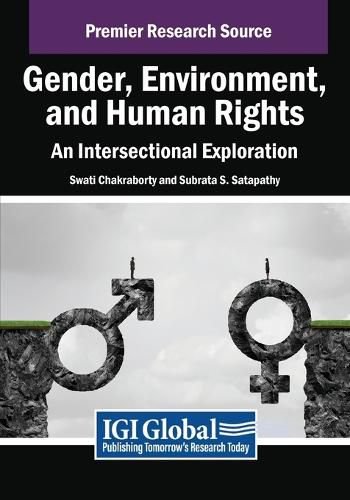Readings Newsletter
Become a Readings Member to make your shopping experience even easier.
Sign in or sign up for free!
You’re not far away from qualifying for FREE standard shipping within Australia
You’ve qualified for FREE standard shipping within Australia
The cart is loading…






This title is printed to order. This book may have been self-published. If so, we cannot guarantee the quality of the content. In the main most books will have gone through the editing process however some may not. We therefore suggest that you be aware of this before ordering this book. If in doubt check either the author or publisher’s details as we are unable to accept any returns unless they are faulty. Please contact us if you have any questions.
The intersection of gender, environment, and human rights reveals a complex interplay that underscores the need for an inclusive approach to addressing global challenges. Gender disparities often influence how individuals experience and respond to environmental issues, with women and marginalized communities frequently bearing the brunt of environmental degradation and climate change due to socio-economic inequalities. Integrating a gender perspective into environmental and human rights frameworks is crucial for achieving equitable and sustainable solutions. This approach ensures that policies address the specific needs and contributions of all genders, promoting justice and empowerment while safeguarding environmental resources. Recognizing and addressing these intersections can lead to more effective and inclusive strategies for protecting human rights and fostering environmental sustainability. Gender, Environment, and Human Rights: An Intersectional Exploration raises awareness about the interconnectedness of gender dynamics, environmental sustainability, and human rights violations, fostering a deeper understanding among readers. It advocates for change by spotlighting existing injustices and empowering readers to engage in meaningful action, whether at the individual, community, or policy level. Covering topics such as climate change, knowledge systems, and sustainable development, this book is an excellent resource for academicians, scholars, policymakers, activists, students, educators, and more.
$9.00 standard shipping within Australia
FREE standard shipping within Australia for orders over $100.00
Express & International shipping calculated at checkout
This title is printed to order. This book may have been self-published. If so, we cannot guarantee the quality of the content. In the main most books will have gone through the editing process however some may not. We therefore suggest that you be aware of this before ordering this book. If in doubt check either the author or publisher’s details as we are unable to accept any returns unless they are faulty. Please contact us if you have any questions.
The intersection of gender, environment, and human rights reveals a complex interplay that underscores the need for an inclusive approach to addressing global challenges. Gender disparities often influence how individuals experience and respond to environmental issues, with women and marginalized communities frequently bearing the brunt of environmental degradation and climate change due to socio-economic inequalities. Integrating a gender perspective into environmental and human rights frameworks is crucial for achieving equitable and sustainable solutions. This approach ensures that policies address the specific needs and contributions of all genders, promoting justice and empowerment while safeguarding environmental resources. Recognizing and addressing these intersections can lead to more effective and inclusive strategies for protecting human rights and fostering environmental sustainability. Gender, Environment, and Human Rights: An Intersectional Exploration raises awareness about the interconnectedness of gender dynamics, environmental sustainability, and human rights violations, fostering a deeper understanding among readers. It advocates for change by spotlighting existing injustices and empowering readers to engage in meaningful action, whether at the individual, community, or policy level. Covering topics such as climate change, knowledge systems, and sustainable development, this book is an excellent resource for academicians, scholars, policymakers, activists, students, educators, and more.